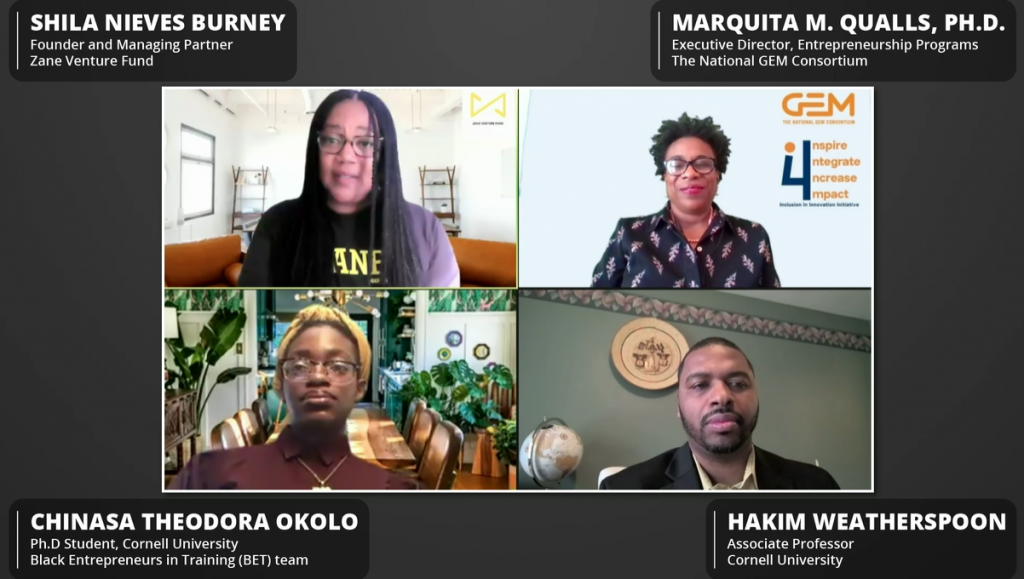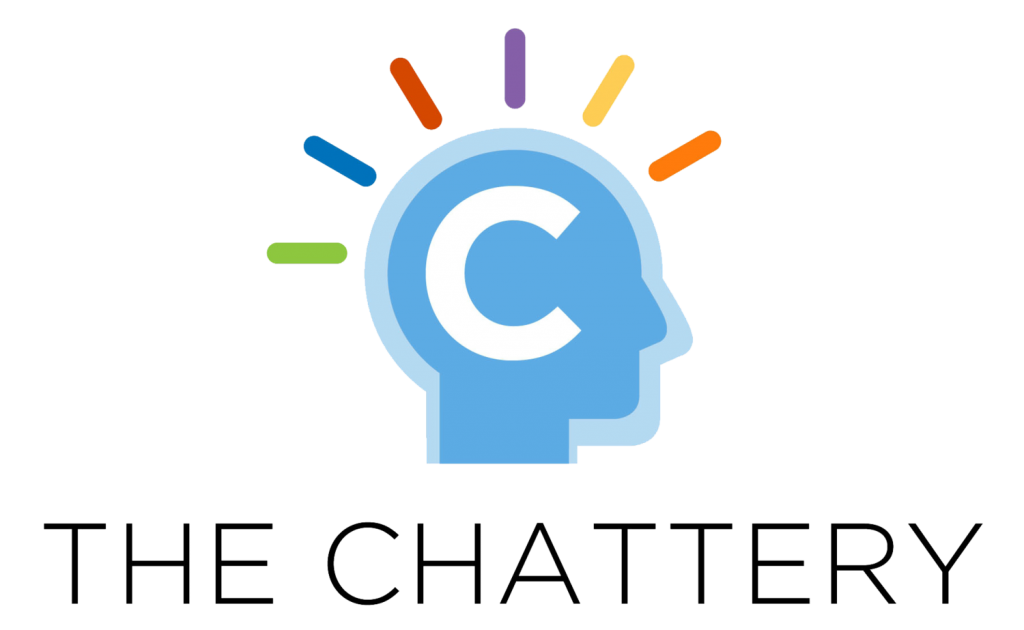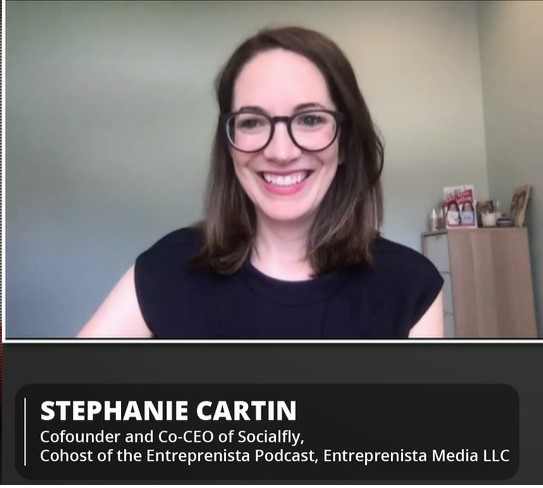Report from the Bank of America Institute for Women’s Entrepreneurship at Cornell University– Dr. Deborah Streeter (Faculty Director) and Kirsten Barker (Program Director)
Background
Recently we reached out to the
Institute participants and asked about how everyone is coping with what
psychotherapist Esther Perel calls “working with home” in a recent podcast. (See
full text of our email at the end of the article.) We asked three questions:
- How are you managing your
work with home?
- How have you experienced a rearrangement of
priorities due to the pandemic?
- For you, during the pandemic, what has been the
“light shining through the cracks” in terms of relationships and your
business?”
We received more than 100 responses and the comments were wide-ranging and heartfelt. For example, Sherley* responded, “This pandemic is strange,” reflecting the dismay many feel at this time in our country’s history. Cydney echoed the feelings of many when she responded, “Life is not the same for any of us.” Even though she expressed a certain powerlessness (“I have invited work into my home not by choice but by circumstance”), she also acknowledged the privilege of being able to work from home. Many answers were nuanced, describing both the good and the bad outcomes these entrepreneurs are experiencing. Veonne characterized the ambiguity this way: “[It’s] a mixture of greatness…and frustration,” bringing both gifts and burdens. There were expressions of joy and also of deep sadness. A common theme was the frustration and guilt arising from the conflicting roles women face as they try to balance home and work responsibilities. Elle admits that although she is coping, “Neither my kids nor my job are getting 100% from me.”
In this report, we do our best to
capture the variety and intensity of various answers, focusing on three themes:
1) the benefits and costs of working with home, 2) the specific coping strategies
people are employing and 3) the sources of “light shining through the cracks,”
— what/who is providing hope and
support during the pandemic.
Working with Home – Positive or negative?
1. The Downside
Perhaps the most devastating
effect of the pandemic has been the loss of family and friends due to the COVID-19
virus. Another difficult outcome for
some has been the disruption in business and loss of income. In fact, for many, work has been challenging
or non-existent. Limitation in travel, interruptions
in service-based businesses and declining revenues have hit small businesses
very hard. Even for companies like
Erica’s (Accent Group Solutions)
who were designated “essential businesses” and received government relief
(PPP), there were hard choices. For
example, Erica faced difficult decisions regarding “right sizing our team,
dramatically cutting expenses, and re-evaluating our remaining revenue.”
Another frequently mentioned
problem was the extension of the workday.
Many entrepreneurs reported
struggling with priorities, noting that it was easier to prioritize when
working outside the home. As Rehana put
it, because of the circumstances of the pandemic “work requires a lot more hours.”
Sherley found herself working 10-12 hours in the early stages of the pandemic,
trying to “meet the expectations of a demanding and unappreciative boss.” By June she reached a breaking point and
pushed back her hours. Many, especially
single parents, mentioned exhaustion of managing work life and home
responsibilities, such as taking care of infants, homeschooling kids or
grandkids and/or caring for senior parents.
Danielle said she is “basically up all day with the baby and all night
working on my business. Some days, it’s
beyond exhausting.” This conflict in
role can create difficult choices. Elle, as a caregiver of both a chronically ill
child and an elderly mother, noted that sometimes “personal work tasks get
pushed to the back burner” and that it is “painful to turn down jobs.” And Dallisa notes that being single presents
its own challenges. She notes that “nobody but me is holding me accountable to
the amount of work I do and I tend to overwork…it has been lonesome at times.”
Fatigue was mentioned by many
respondents, who reported headaches and eyestrain as a result of hours spent online
and in Zoom meetings. Some reported
“locked-in” syndrome, especially early on during more restrictive stay-at-home
policies. Krishula always thought of her home as her “detox
space and peace of mind after work” but
during those early days there was a constant blurring between her business and
home settings.
Working with home creates
a lot of conflicts between the different roles that women play. With spouses and children all vying for
internet bandwidth and quiet workspaces, some found it very difficult to be
productive. The added burden of guiding
children through online schooling also created difficulty in setting priorities
and getting work done. Self-care, many
reported often falls to the bottom of the list or doesn’t happen at all.
2. The
Upside
Many reflections on the pandemic included
gratitude for unintended consequences that have arisen from difficulties caused
by the pandemic. For some, who
characterized themselves as introverts or were already working at home, the
change has been fairly straightforward.
For example, for Laurat, said, “Home is safe, quiet, peaceful and a
place to nurture and implement new ideas. For that reason I’ve launched new
projects, ideas and partnerships.” For Christina, “the pandemic has offered me the
ability to make all meetings remote meetings. I get nervous in person, but I’m
very used to talking into a computer mic due to all the online games I played
in college.”
By far the most often mentioned
benefit was that people feel closer to family and friends. Mira said that instead of always giving
priority to her clients’ needs, the pandemic forced her and others to hit the
“pause” button. In doing so,
she realized “that family, friendships and health should always take priority.” In a similar way, Beth said the situation has
allowed her to “build better bonds with friends and family.” With more calls,
emails and facetime sessions with family, respondents felt they had a strong
support network. As Sheila put it, “We
comfort one another, we love one another, we laugh and cry together.”
The dramatic impact of COVID
seems to have had a way of clarifying personal decisions about
relationships. In some cases, this has accelerated
the end of a waning or unhealthy relationship. Natosha’s “personal relationship hit a rock
and cracked wide open, I was in something that no longer served me…I won’t
tolerate what I don’t need.” For others, like Danielle, “6 months working from
home together was bound to have an effect on my marriage! Luckily, it was a
good one. If anything, the pandemic has reminded me why we got married in the
first place.” For Kara and her
relationships, she was able to make distinctions: “Ones that I thought were lacking have grown
stronger and those that I needed to let go of I have.” Carmella said she has
attained a deeper understanding of self because she could “sit, think &
reflect… and this has rolled over into my business as well… I’ve been able
to deeply define my ‘why’ and found my motivation again.”
Other outcomes included the push
toward more efficient organization and decision-making. In many cases, working
at home was reported to have eliminated what used to be a long commute, and
provided time to de-clutter and prioritize.
Frequently, respondents mentioned that the heightened state of urgency
caused by COVID-19 had resulted in the streamlining of decision-making. For example, Natasha shared that she felt a resurgence
of creativity, because the pandemic “has
allowed for an embrace of change and transition…in really quick span of time”
and that as a result she “can no longer put things off or wait for the perfect
time.” This feeling of being forced to
prioritize was echoed by many other comments, such as Thien-Kim’s remark that
she is “more ruthless about what is a priority and what can be done later.” Kimberly said that because of the threat of
the virus, she has prioritized her health more and she is “[e]ating and
exercising on a regular schedule for the first time in a decade.” Often
comments reflected a feeling of slowing down and a re-examination of the
stressful pace of business and personal life.
With great emphasis, Kim said she has realized “WHY DO I NEED TO RUSH
ANYTHING?” Connie reported that “[e]very
priority shifted. I went from is this a need or a want? On the scale of 1-10
how important is this or that?” Charita
commented that she feels “empowered to decline requests without feeling guilty
so that I don’t have to juggle so much.”
By admitting the situation is “a one-wheeled wagon,” Kate allows herself
“to ride the wave of the day without guilt.”
The pandemic seems to have
brought awareness to many about what is important in their lives. For example, Erin relays that she has “made
some bold choices because of it. I decided to pivot my business, go back to
school, and reach out to someone I dated a long time ago and had never
forgotten (and we’re happily together again… she hadn’t forgotten either)
because the pandemic just gave me such clarity: this is our one and only
life… we don’t know how long we get.”
Her advice: “send the letter,
decide boldly, and live and work like you don’t get a second chance.” Likewise,
Sheila reports “Because of the world stopping dead in its tracks, I have experienced
a rearrangement in my priorities. I have decided to take a step back from my
role [with a client] over the course of the next few months, and focus on
expanding my business. I believe that if things had stayed the same and there
had been no pandemic, I would not have considered this option.” For others, the
situation has helped them make difficult decisions. Bernetta has seen this as a time to re-set, and
to ask the question whether her business is really needed and where she really
wants to do it. Michelle found her
business hard hit and decided to refocus “on home, studying for a personal
lifelong goal of passing the CPA exam, and pivoted my nonprofit to focusing on
families in the community.” For Shubhra, her sustainable clothing business
ground to a halt, forcing her to pivot towards building a consulting
business.
Many expressed a renewed
appreciation of the kindness of others. Rehana
notes that everyone has been able to connect with people on a deeper level
since they have more opportunities to reflect on the importance of
relationships: “I think we’re much more
aware of how fragile things can be since the pandemic has caused deaths and
long-term illnesses in those who have recovered.” She notes that “people were usually ‘nice’
before, but people seem more ‘kind’ these days and genuine. Given the
heightened emotions, we’re all giving each other more leeway, and I hope we
also do that for ourselves.” Paris echoed this: “Friends are more present. The
people around me are more focused on nourishing their relationships with one
another & making those a priority over things that used to be so important
like money. While money has great value, it is not as valuable as the bonds we
make in this life. “
Surprisingly, there have also been some very positive business outcomes for some participants during this COVID-19 chaos. Aniya reported that she has been “able to better connect with clients over the internet and work on projects that I wasn’t able to before the pandemic took place.” Many respondents noted that current environment has driven them to expand the virtual side of their businesses, with good results. For example, Thien-Kim (Bawdy Bookworms) has found her business booming. Moniquea (LBE Business Solutions) and others have found the transition to increased online buying has meant her “opportunities have expanded and my business has grown!” Cassandra (The Stocks & Stilettos Society) was surprised by “an explosive growth spurt” resulting in an expansion in her staff. Tonya (Accented Glory) also found her business starting to thrive specifically because of changes in the current climate: “My sales have doubled and I attribute that to my marketing strategy, increase in online shopping, and movement to support black owned businesses. Some folks are choosing to protest social injustices with their dollars and supporting black brands.”
Strategies for surviving work with home
Whether on the positive or
negative side of the ledger when it comes to dealing with COVID-19, respondents
offered an abundance of good advice for surviving this time.
1. Self-care
Respondents responded with many
strategies for dealing with the stress of the current situation. To combat the isolation, Dara employs a
strict schedule, punctuated with “random dance breaks.” Other types of strategies
were mentioned, including Carmella’s “breaks for naps, stretching and
eating,” and Kim’s creation of a
“meditation space…an area that is sacred to me,” to make sure she maintains
balance. In a similar vein, Kassy starts
each day by taking three deep breaths and then proceeds to “journal my 3 things
that I’m going to do with my business, 3 things I’ll do for my well-being or
self, 3 things that I’m grateful for.” This helps her activate a “mindset shift…I
get to prioritize what matters.” Christina, who has had to deal with not only
the pandemic but also Hurricane Laura and Tropical Storm Beta, is using extra
time to pursue hobbies as a distraction and stress relief strategy.
2. Organization
Organizing space and creating schedules
were two frequently mentioned coping strategies. Many used the opportunity to upgrade their
working/home spaces, like Connie who reported, “I really begin to rearrange
everything including the furniture in my home. Seeing everything around me
shift, I knew there needed to be a shift in me also.” Danielle has taken small steps to organize
all parts of her home, including family, kitchen and work spaces, admitting
that “[b]efore the pandemic I thought I was organized, but…I’ve realized how
many things we kept the same even though they weren’t really working…our home
is a lot more optimized for our everyday lives, and a lot prettier for us to
look at!” Several people mentioned setting boundaries for how spaces are used,
including Kassy’s rule that she and her husband will “work at our work stations
and not inside our bedroom” in order to “declutter and set an intention to
where you’re working.”
Some, like Kate, have found it important to rough out a schedule every morning, starting with a 4:30 am wake up time and including a chance “rest or collapse (your choice) at 9:20 for about 30 minutes.” Others also reported using a daily to-do list approach, with phone alerts at transition times. For example, Lesley emphasizes the importance of setting an alarm so you know when to “turn off”” because otherwise “before I know it , it’s 4 and I haven’t had lunch or it’s 9 and I’m still working.” For Erin it is important to set “self-care ‘non-negotiables’ like yoga, enough water, sleeping well, breaks during the day (this is hardest for me!), shutting off at a reasonable time (because working late into the night *seems* like a good idea, but wrecks mental health…).” Some of these strategies are difficult to employ if you are in a small space. Courtney notes that since she is in a small condo, “it’s difficult to completely separate the ‘home’ part of my home, and the ‘work’ area. I’ve failed miserably the past week, but my plan was to never turn on the tv during working hours.”
Many mentioned that they set
priorities more carefully, continually questioning “what matters?” Natosha is explicit: “I don’t do anything that makes me unhappy.
I’ve started a garden, sewing, purging my home and making sure I spend quality
time with my children and family.” Some,
like Tricia, “set specific office hours” to establish a consistent response
time. Others, like Shakira, have rules
such as “no emails after 6:00 pm.” Other
time management ideas include: avoiding a commitment to too many tasks outside
work, outsourcing tasks that are not in your core competence, and limiting
meetings with friends to those you care about.
Shamarla stated, “My priorities are simple now: I just want family and I
to stay alive.” Many echoed this, stating that family and loved ones are the
number one priority now. Jera is being “scrupulous about what I bring back into my
life in terms of commitments and standing activities. Even with my business, if
the project is too complicated, this is not the right time to take on that addition.” Paris sums this up: “Things that used to be important no longer
are, the bigger picture is clearer.”
There were also many comments
that suggested help in terms of managing family pressures. For example, some are scheduling buffer times
between tasks to check in with kids who need emotional or logistical support,
creating checklists for home care tasks, taking shifts with partners, and
grocery shopping during the week to avoid the crowds. Sheena puts it well: “There is no blueprint
on how to deal with a pandemic raising a family with small children or even
running your business from home….we are all human and that is our super power.”
3. Attitude
Adjustments
Women who responded to these
questions often observed internal changes they are feeling. Often this was described as a sort of call for
empathy. Pandemic mantras were offered
up, such as Danielle’s (“be kind”) and
Toni‘s (“Balance, Grace, and Humanity”). With a similar theme, Cydney says we
all should “extend amounts of grace to
one another no matter where you fall on hierarchical ladder in your company.
Life is not the same for any of us and…[this is a] gentle reminder that I have
an option of how I do my job from home.”
In a related vein, Ashley said she was focusing on giving herself the “grace
to grow through the uncertainty. I’ve learned to loosen the reigns and be okay
with a new rhythm.” Deepening her
understanding of herself because of the opportunity sit, think and reflect,” Carmella has been able to “deeply define my ‘why’
and found my motivation again… I don’t feel like I’m in a rat race anymore…
the extra time has helped me to take time to see and fully understand the
bigger picture at hand.” Perhaps Toni
sums it up best by saying. “This pandemic…is a gift in the form of a reset
button wrapped in very ugly holiday paper… there is beauty in this moment but
you have got to shut out the noise to see it.”
Some are finding that the
pandemic has helped them evolve and grow in confidence. Keisha has greatly enjoyed her “time away
from outside influences and energies” and Natasha says “I can no longer be
worried or concerned with what I perceive others will think or say about me
stepping out on my own to own my own business. I can no longer create
limitations to my ability.” Likewise, Bethany confides that on a deeper level,
“fear has been holding back my creativity.” Courtney says “I always wanted to
be a creative person…it took a life-changing pandemic to expose that part of my
life” resulting in writing and self-publishing a book.
Light Shining Through the Cracks
In commenting on the current state of the world in a podcast, Psychotherapist Esther Perel comments: “In the relational sense…a pandemic, a disaster, often will highlight the cracks and it will also highlight the light that shines through the cracks.”
Respondents identified many
sources of light shining through the difficulties they are dealing with during
this crisis. (One even said that the
Institute courses were helpful!) The
number one source they identified: Family. As Niharika put it, she feels support from
“[an] understanding partner, smiles from my child, stability of work and
home.” For Kim, as result of living in
such close quarters, “[w]e all talk more
and make time to really let each other know how we appreciate each other.” She has lost several family and friends during
COVID times and because of it, “this it has made all of us really place value
on the important things. Not stuff but PEACE.” Sheena pointed out, “we all
share a commonality of being home. We are all making the best of what we are
currently in and it helps in terms of encouraging each other.” Husbands,
partners, fathers, mothers, children, and other relatives – all were mentioned
in various comments as important sources of hope.
Entrepreneurs are also deriving
strength from their clients. For
example, Natalya says, “the light that has been shining all these months is the
emotional support of my existing patients who want my business to survive and
flourish.” This support has made her “really appreciate the bonds” that she established with them over time. Tonika echoed this, calling the pandemic “an
experience like none other and one that I hope will never occur again.” She expresses thankfulness for ongoing client
work, noting, “I have chosen to give my
time to listen, laugh and learn. This has proven to aid in maintaining the
normalcy that I need to thrive…I have given myself grace and been more than
forgiving when I need to take a break.“ Mych’layla pointed out “[p]eople want hope…they need
hope,” and added that the virtual
setting for her meetings has allowed her clients to reach out to her despite
the need for social distance: “The
pandemic has strengthened my business relationships as well as those in my
home.“
There were also expressions of hope for the future. Kimberly expressed this optimism: “[the pandemic] has been an unplanned sabbatical which is filling me back up so I can be more present in the future.” Talking about both the cracks and the light, Tonika addressed the “gaping hole” that has been revealed: “So many things have been revealed about our country- its politics, infrastructure, healthcare, racism, etc. ” As a result, she pointed out, there is the new level of awareness and an opportunity to change what had blindly been accepted as the norm. “The light has always been present but there has been apprehension to allow it to shine. In this time, I have seen the light and it shines brightly for me. I feel its warmth and I am renewed. I have honored this time despite the disruption it has caused to my former way of living…I have paused and acknowledged how I am feeling and what I can control.” Echoing many others, she goes on: “For me this has created an opportunity to connect and reconnect with family and friends in ways that I had not thought about. Things are not ideal but the power that is found in speaking the truth about pain, worry, and hope has fortified me. That power has been fuel to move my business forward and I am growing professionally.” She ends by saying “Today I am thankful that I see the light and the light is exactly what I need.”
*We have opted to use only first names in this report. Where we have permission, we occasionally mention company names.
This is the question that we asked participants which led to these thoughtful responses: Today is the first day of fall, typically a time of new beginnings, most clearly symbolized by the start of a new school year. But in 2020, instead of feeling like a fresh start, fall has been characterized by chaos in school openings, tragic weather events and a tense political environment. As a result, today we are reaching out to hear about how this has been impacting each of you. A recent episode of the Ted Radio Hour podcast featured Psychotherapist and New York Times bestselling author Esther Perel. The discussion is focused on ideas about how to create lasting bonds in romance, family, and at work. Towards the end of the episode, the hosts asks Esther how she sees the pandemic impacting the world of relationships at work. Here are a few excerpts that caught our attention: “I don’t think we are working from home, I think we are working with home…[we] are inhabiting all our roles at the same time…it’s all happening in the same chair in the kitchen.” “What a pandemic does, for work and for personal, it rearranges your priorities…[like other disasters, it] is an accelerator because it bring loss to the forefront. At that moment, you say “What am I waiting for? I’m going to do what is important… I don’t want to accept things that the brevity of life doesn’t allow me to accept anymore.” Esther predicts a burst of creativity as a result of the pandemic because “there is a rearrangements of priorities and a reaching for the essence.” In her experience, people are having “much deeper conversations…there is a level of depth that is resurfacing that is very beautiful.” And finally, she comments: “In the relational sense…a pandemic, a disaster, often will highlight the cracks and it will also highlight the light that shines through the cracks.” Now it’s your turn. Please share your thoughts on any/all of these three questions: 1) How are you managing your work with home? 2) How have you experienced a rearrangement of priorities due to the pandemic? 3) For you, during the pandemic, what has been the “light shining through the cracks” in terms of relationships and your business?”









